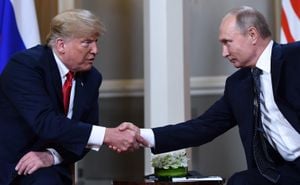Saudi Arabia's Crown Prince Mohammed Bin Salman and Russia's sovereign wealth fund chief Kirill Dmitriev played significant roles in the negotiations for the release of US teacher Marc Fogel from Russian prison. This information, disclosed by a source familiar with the negotiations, highlights the growing involvement of Saudi Arabia and Russia as mediators between the United States and Russia.
The release, which occurred following complex negotiations, signals both countries' willingness to engage diplomatically on issues involving the US. Fogel had faced imprisonment under harsh conditions and his release was announced after prolonged discussions. US Middle East envoy Steve Witkoff facilitated the transfer, being quoted on social media where he underscored Bin Salman's instrumental role. He mentioned, "a gentleman from Russia by the name Kirill had a lot to do with this," indicating Dmitriev's direct involvement.
Russian President Vladimir Putin also acknowledged Bin Salman's contributions during prior exchanges, expressing gratitude for the Saudi leader's involvement. The relationship between Bin Salman and Putin dates back to 2015, when the Crown Prince first visited Russia, laying the groundwork for their close partnership.
Reports suggest the negotiation dynamics involve not just prisoner releases but potentially pave the way for high-level summits aimed at de-escalation of tensions and fostering economic cooperation, particularly about energy supplies. Recent analyses propose Saudi Arabia as a potential venue for future Russia-US dialogues, reflecting the strategic interests sought by both nations.
Kirill Dmitriev, who has maintained close ties with American business circles, plays a pivotal role as he previously participated actively during Trump’s earliest contacts with Russian officials. Known for his function as head of the Russian Direct Investment Fund, Dmitriev previously helped secure the release of US investment banker Michael Calvey, showcasing his influence. He once described Calvey as "a professional investor" and personally vouched for his character, enhancing his stance as an intermediary.
US President Donald Trump is also reportedly pushing for renewed negotiations related to multiple fronts, including the recent situation involving Ukraine. On February 12, 2024, he discussed efforts to end the war with Putin, reflecting his administration’s broader engagement strategy with Russia. Trump remains focused on diplomatic channels, and the successful prisoner exchange increases the goodwill and negotiations efficacy.
Despite some uncertainties on the reactions of US lawmakers, the cooperation demonstrated between Saudi Arabia and Russia over this exchange could signal fresh opportunities for dialogue. Both nations have complicated histories with the US, yet the convergence on prisoner exchanges highlights the potential for collaborative frameworks even amid geopolitical strife.
Some analysts suggest the prisoner swap reflects not only human interests but also the need for strategic alliances, with the region playing a significant role. Observers will be closely watching how this release might influence future discussions on broader geopolitical issues.
While the Kremlin did not provide immediate comment at the time of reporting, the overall silence from key players hinted at the sensitivity of these negotiations and their potential ramifications. The delicate nature of these discussions denotes their importance as both nations follow through on promises of easing hostilities during talks.
The recent developments serve as reminder of the intertwined paths of diplomacy, where human lives become pivotal points of engagement. Future dialogues will inevitably reference this incident as both sides navigate the complex waters of international relations plagued by years of contention.



